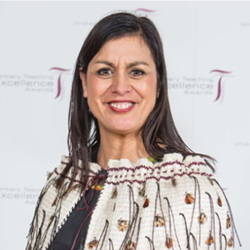
Associate Professor Suzanne Pitama
Prime Minister’s supreme award recipient 2015
Also Award for sustained excellence in tertiary teaching – Kaupapa Māori category
Associate Dean Māori, Director of the Māori / Indigenous Health Institute, Division of Health Sciences University of Otago
“I began this journey into teaching because I wanted Māori patients to have an opportunity to be validated as both patients and Māori in health settings.”
Suzanne Pitama is driven to prepare medical students to integrate cultural and clinical competencies helping to eliminate health inequities for Māori. In a teaching career distinguished by innovation, excellence, learner-centredness and leadership, perhaps her greatest contribution is to the Māori community. Responding to student feedback, Suzanne initiated Hauora Māori Day in 2010 involving 100 5th year students and 35 clinical staff providing free health screenings to the Māori community. A colleague writes, “Over 600 members of the Māori community have received free health screens. This is a model of how social accountability in medicine can be implemented.”
Colleagues say Hauora Māori is now a strength in the University of Otago’s medical curriculum. Suzanne teaches her Māori models of health, The Hui Process and The Meihana Model so that they become more than just another subject but become second nature to her learners. A former student writes, ”I see my colleagues on the ward using te reo Māori with Māori patients, building whakawhanaungatanga with them and their whānau.”
Her career is distinguished by an unstinting dedication to the Māori community. Prior to teaching, Suzanne spent valuable time working as a clinician. This is the bedrock of her teaching philosophy. Her internationally recognised Māori models of health, The Hui Process and The Meihana Model epitomise that teaching philosophy and her connectedness to the community. A health worker says, “people have said they would rather see a student than an older already established doctor because they feel like the students are more engaged in their health journey and understand better.”
Suzanne aims to “prepare new clinicians to be confident in demonstrating both cultural and clinical competencies to address health inequities and contribute to Māori health gain.” This is about making evidence based good practice second nature to learners.